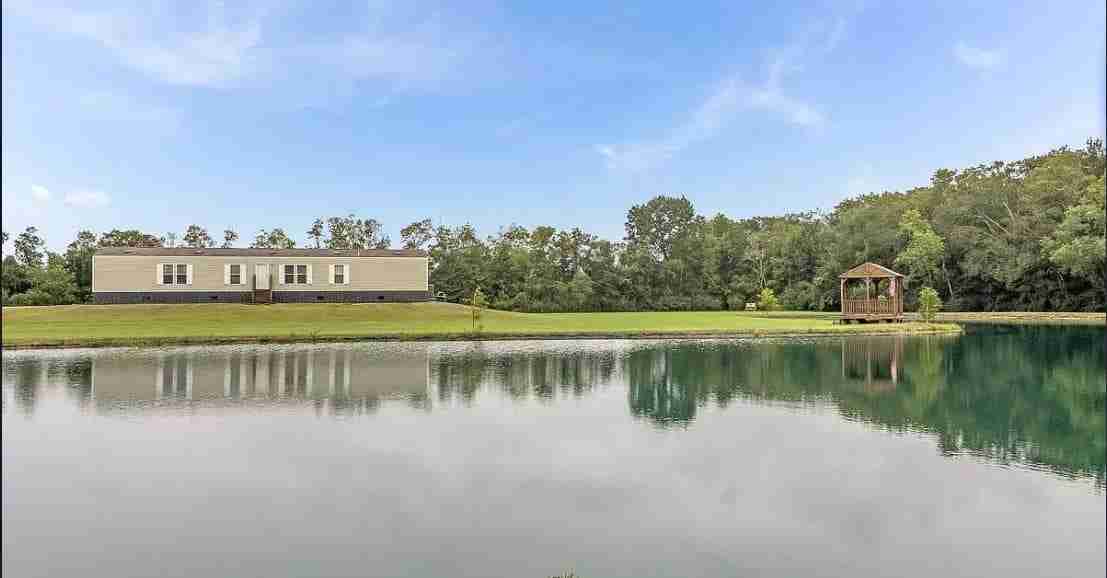The use of chattel financing for manufactured homes has exploded in recent years. 80% of new manufactured homes purchased in 2015 were titled as chattel. Only 34% of those were placed in a manufactured home community which means 66% of new manufactured homes bought in 2015 may have qualified for a standard mortgage but instead the homebuyers opted to forego permanent installation and went with chattel financing. Why are more homebuyers going with chattel loans over a traditional mortgage even when they own the land under the manufactured home?
In this article, we’ll try to answer that question and many more. We’ll cover the basics of chattel financing for manufactured homes and look into the differences between loans through a private bank or a manufactured housing lender.
2 Types of Loans for Manufactured Homes
There are two ways to finance a manufactured home both new and used. The first is with an FHA or conventional home mortgage and the second is a chattel loan. Chattel loans are the most popular loans for all manufactured homes.
Related: FHA Loans and Other Manufactured Home Financing Options
FHA and Conventional Mortgages for Manufactured Homes
When a manufactured home leaves the factory it is automatically classified as personal property or chattel.
In order to qualify a manufactured home for an FHA or conventional mortgage, it must be permanently installed on land owned by the person buying the home and have a fixture filing recorded.
“In 43 states, a manufactured home remains personal property until the manufactured homeowner completes the “Conversion Procedure” – a statutory procedure for electing to convey and encumber a manufacture dhome as real property. In those states, completely the conversion procedure legally converts the manufactured home to real property for all purposes. Thus, absent such a process, a manufactured home will not comnstitute as a fixture.”
Fannie Mae, June 2018
Once the conversion procedure is done, the manufactured home will be classified as a fixture to the real estate.
There is a 3-part test used to determine whether the manufactured home is a fixture:
- How is the home affixed to the real estate?
- What is the intent of the home? (this is the most important factor)
- What are the fixture and real estate used for?
What is an FHA or Conventional Mortgage?
If the home buyer owns their own property and has the home permanently installed on that land as a fixture, they can reclassify the home as real property and qualify for an FHA or conventional mortgage.
66% of all mortgages are conventional with the rest being FHA, VA, or USDA backed.
FHA mortgage loans are insured by programs of the Federal Housing Administration. When a loan can be insured by Fannie Mae or Freddie Mac lenders are more prone to lend.
A conventional loan is not insured by the government but by private mortgage insurers (aka PMI). These are a bit easier to get.
Average Terms for FHA and Conventional Mortgage
Having the home installed as a fixture and reclassified as real property is only the first step in getting an FHA or conventional mortgage.
Both FHA and conventional mortgages have higher requirements than a chattel loan. With FHA loans you need to meet both the lender’s requirements and the FHA’s. Here are just a few of the typical terms and requirements for a conventional mortgage:
- Applicant must have 620+ credit
- As low as 3% down
- As high as 36% debt to income ratios (but can go as high as 50%)
- 15, 20, or 30- year terms
- Max loan of $484,350 but can go as high as $750k in places like LA
- Average APR is currently between 2.88% and 5.75%
Defaulting on an FHA or Conventional Mortgage
If a manufactured homeowner has a FHA or conventional mortgage on their property and can’t pay the loan there are several steps before repossession occurs that will protects the homeowner.
First, the lender must provide homeownership counseling notice and implement an error resolution procedure. Next, they must comply with “constraints related to force-placed insurance, follow early intervention requirements, and provide for a single point of contact for loss mitigation.” (Fannie Mae, June 2018)
Finally, in most states, judicial court proceedings must occur before foreclosure. This entire process can take anywhere from 300 to 1,230 days.

Related: 3 Financing Options When Buying a Manufactured Home
Chattel Loans for Manufactured Homes
What is a Chattel Loan?
If the manufactured home will not be permanently installed on owned land it will remain classified as personal property. These homes are only eligible for chattel loans.
By definition, a chattel is an item of moveable property other than real estate. Cars, boats, RVs, heavy equipment and manufactured homes are all considered chattel. However, in most situations when you hear the words chattel loan they mean a loan on a moveable home, aka a manufactured home.
Investopedia states that in some parts of the country chattel home loans are referred to as simple security agreements and the terms ‘personal property security’ and ‘a lien on personal property’ are synonyms for a chattel mortgage. Interest rates on these loans are typically much higher than traditional mortgages and during an active chattel loan, the lender has conditional ownership of the property (Investopedia).
Chattel loans will have an APR that is usually 1-2% higher than a traditional loan and will not have the same protections as traditional mortgages. Average terms for a chattel loan are between 15-23 years whereas a traditional mortgage can have termed as long as 30 years. A lender can take possession of the manufactured home much quicker than a traditional mortgage lender after delinquency. In addition, it is very difficult (if not impossible) to get a chattel loan refinanced.
Average Terms of a Chattel Loan
Cascade Loans has a list on their site of typical qualifications for manufactured home financing:
- Applicant must have 575+ credit
- Minimum loan amount of $35K
- New single or multi-section manufactured homes are eligible
- As low as 5% down
- As high as 50% debt to income ratios
- 20-23 year terms
- Max loan of $125K
Related: Deciding Factors of Manufactured Home Financing
Since chattel loans are mostly used for manufactured homes that are not permanently installed on buyer-owned land the government does not regulate them or insure the loans like they can with traditional mortgages.
The two government-sponsored enterprises (Fannie Mae and Freddie Mac) will more typically buy or securitize loans secured by real estate, while staying clear of “chattel loans” — used for most manufactured home purchases — a type of financing in which a home is not legally bound to its land.
AmericanBanker.com
Current Sources for Chattel Loans
CFED, a nonprofit agency in Washington DC, has a division called I’M HOME that advocates manufactured home financing. They answered the FHFA’s request for input about chattel financing in 2017. In that answer for input they created a list of the top 5 sources for chattel loans in the nation:
They also found that over 2,700 lenders originated at least one manufactured home chattel loan in 2015.
Parks also offer chattel financing. In their report, CFED states that over 500 land-lease communities have provided over $3.5 billion in park-owned seller financing. Though this is mostly concentrated by only the largest parks, representing the “ownership of about 25% of the country’s 50,000 land-lease communities.” (CFED I’M HOME 2017)
Defaulting on a Chattel Loan
Defaulting on a chattel loan is completely different from default on an FHA or conventional mortgage. The UCC (Uniform Consumer Credit Code) typically regulates chattel loans but 11 states have their own regulations.
The process for repossessing and reselling a manufactured home secured by a chattel loan requires sending the “debtor a notice of default and a right to cure; gaining possession of the manufactured home either by voluntary surrender or court order; sending the debtor a notice of repossession, notice of right to reinstate, notice to redeem and notice of private or public sale; remarketing the manufactured home; conducting the sale; documenting the sale; retitling the manufactured home, and sending the debtor an Explanation of Calculation of Surplus or Deficiency or a waiver of Deficiency.” (Fannie Mae, June 2018)
This entire process takes only 30-81 days.

Conclusion for Financing for Manufactured Homes
As we learned, it’s a lot easier to obtain chattel financing for manufactured homes but there are far more protections and better terms if a homebuyer transfers the home into real property.
In order to help our readers prepare for a chattel loan or a traditional FHA or conventional loan, we’ve put together 2 finance planners that can help you understand your expenses better. Just click to be taken to Slideprint the PDFs out.
Have you transferred your home into real property? We’d love to hear about your process in the comments below.
As always, thank you for reading Mobile Home Living!

You should let me write an article on financing There is more to financing then this. There are some interesting quirks that one might not notice if they didn’t do their research. Did you mention that Vanderbilt only loans on Clayton homes, repos on VMF.com and private individuals selling their own home?
I’d be happy to publish an article from you, Kieran. My email is getfeatured@mobilehomeliving.org.
Informative article, but there are home age restrictions for FHA and conventional financing which can be a deal breaker for those that can’t afford ‘newer’ mobile homes.
Hi Miss Anna,
You are absolutely right and I’ll add that to the article. Thanks for catching the omission!
I found it difficult to find financing for a 19 year old single wide (large 3 br 2 ba, 16 x 75) that was on a nice 1.7 acre private lot in Ithaca NY but did find financing through Tioga Bank. Now it’s a couple years later and I intend to sell the property, however the mobile is now over 20 years old. Whoever wants to buy it will likely not be able to get financing. Do you have any suggestions? It is spacious, has 2 large sheds, is 15 min from Ithaca and about 20 min from Watkins Glen in the beautiful NY Finger Lakes region, with an up-to-date septic and water system. Ideas?
Thank you for this amazing article. My goal is to buy a manufactured home by January, so right now I’m in the information gathering stage. I have a question about using an FHA/Conventional loan. Can these loans be used to purchase from the dealer? Do I need to use a chattel loan first to initially by the home then finance through FHA, which will then pay off the chattel loan? How does this arrangement work?
Great info, thank you!
Who else offers Chattel financing? Berkshire Hathaway being tied to Clayton Homes and has really bad review when you check them out. What other options are out there for Chattel?